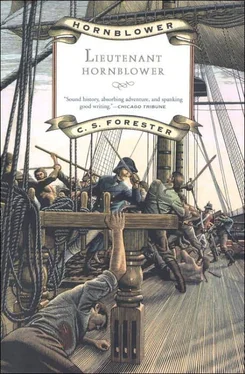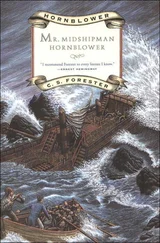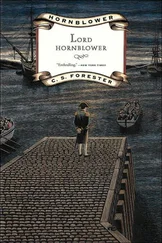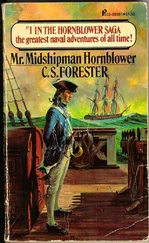“Oh yes.” Buckland looked round him.
“Here’s Wellard, sir.”
“Oh yes. He’ll do.”
“Mr. Wellard,” said Hornblower, “go down with a lantern and see if you can find the other pistol. Bring it to the first lieutenant on the quarterdeck.”
“Aye aye, sir.”
Wellard had recovered from most of his agitation; he had not taken his eyes from Hornblower for some time. Now he picked up the lantern and went down the ladder with it. What Hornblower had said about the quarterdeck penetrated into Buckland’s mind, and he began to move off with the others following him. On the lower gundeck Captain Whiting saluted him.
“Any orders, sir?”
No doubt the word that the captain was incapacitated and that Buckland was in command had sped through the ship like wildfire. It took Buckland’s numbed brain a second or two to function.
“No, captain,” he said at length; and then, “Dismiss your men.”
When they reached the quarterdeck the trade wind was still blowing briskly from over the starboard quarter, and the Renown was soaring along over the magic sea. Over their heads the great pyramids of sails were reaching up—up—up towards the uncounted stars; with the easy motion of the ship the mastheads were sweeping out great circles against the sky. On the port quarter a halfmoon had just lifted itself out of the sea and hung, miraculously, above the horizon, sending a long glittering trail of silver towards the ship. The dark figures of the men on deck stood out plainly against the whitened planks.
Smith was officer of the watch. He came eagerly up to them as they came up the companionway. For the last hour and more he had been pacing about in a fever, hearing the noise and bustle down below, hearing the rumours which had coursed through the ship, and yet unable to leave his post to find out what was really going on.
“What’s happened, sir?” he asked.
Smith had not been in the secret of the meeting of the other lieutenants. He had been less victimised by the captain, too. But he could not help being aware of the prevailing discontent; he must know that the captain was insane. Yet Buckland was not prepared for this question. He had not thought about it and had no particular reply. In the end it was Hornblower who answered.
“The captain fell down the hold,” he said; his tone was even and with no particular stress. “They’ve just carried him to his cabin unconscious.”
“But how in God’s name did he come to fall down the hold?” asked the bewildered Smith.
“He was looking for mutineers,” said Hornblower, in that same even tone.
“I see,” said Smith. “But—”
There he checked himself. That even tone of Hornblower’s had warned him that this was a delicate subject; if he pursued it the question of the captain’s sanity would arise, and he would be committed to an opinion on it. He did not want to ask any more questions in that case.
“Six bells, sir,” reported the quartermaster to him.
“Very good,” said Smith, automatically.
“I must take the marine corporal’s deposition, sir,” said Hornblower. “I come on watch at eight bells.”
If Buckland were in command he could put an end to the ridiculous order that Hornblower should stand watch and watch, and that Bush and Roberts should report to him hourly. There was a moment’s awkward pause. No one knew how long; the captain would remain unconscious nor in what condition he would regain consciousness. Wellard came running up to the quarterdeck.
“Here’s the other pistol, sir,” he said, handing it to Buckland, who took it, at the same time drawing its fellow from his pocket; he stood rather helplessly with them in his hands.
“Shall I relieve you of those, sir?” asked Hornblower, taking them. “And Wellard might be of help to me with the marine’s deposition. Can I take him with me, sir?”
“Yes,” said Buckland.
Hornblower turned to go below, followed by Wellard.
“Oh, Mr. Hornblower “ said Buckland.
“Sir?”
“Nothing,” said Buckland, the inflection in his voice revealing the indecision under which he laboured.
“Pardon, sir, but I should take some rest if I were you,” said Hornblower, standing at the head of the companionway. “You’ve had a tiring night.”
Bush was in agreement with Hornblower; not that he cared at all whether Buckland had had a tiring night or not, but because if Buckland were to retire to his cabin there would be no chance of his betraying himself—and his associates—by an unguarded speech. Then it dawned upon Bush that this was just what Hornblower had in mind. And at the same time he was aware of regret at Hornblower’s leaving them, and knew that Buckland felt the same regret. Hornblower was levelheaded, thinking fast whatever danger menaced him. It was his example which had given a natural appearance to the behaviour of all of them since the alarm down below. Perhaps Hornblower had a secret unshared with them; perhaps he knew more than they did about how the captain came to fall down the hold—Bush was puzzled and anxious about that—but if such was the case Hornblower had given no sign of it.
“When in God’s name is that damned doctor going to report?” said Buckland, to no one in particular.
“Why don’t you turn in, sir, until he does?” said Bush.
“I will.” Buckland hesitated before he went on speaking. “You gentlemen had best continue to report to me every hour as the captain ordered.”
“Aye aye, sir,” said Bush and Roberts.
That meant, as Bush realised, that Buckland would take no chances; the captain must hear, when he should recover consciousness, that his orders had been carried out. Bush was anxious—desperate—as he went below to try to snatch half an hour’s rest before he would next have to report. He could not hope to sleep. Through the slight partition that divided his cabin from the next he could hear a drone of voices as Hornblower took down the marine corporal’s statement in writing.
Breakfast was being served in the wardroom. It was a more silent and less cheerful meal even than breakfast there usually was. The master, the purser, the captain of marines, had said their conventional ‘good mornings’ and had sat down to eat without further conversation. They had heard—as had everyone in the ship—that the captain was recovering consciousness.
Through the scuttles in the side of the ship came two long shafts of sunlight, illuminating the crowded little place, and swinging back and forward across the wardroom with the easy motion of the ship; the fresh, delightful air of the northeast trades came in through the hookedopen door. The coffee was hot; the biscuit, only three weeks on board, could not have been more than a month or two in store before that, because it had hardly any weevils in it. The wardroom cook had intelligently taken advantage of the good weather to fry the remains of last night’s salt pork with some of the ship’s dwindling store of onions. A breakfast of fried slivers of salt pork with onions, hot coffee and good biscuit, fresh air and sunshine and fair weather; the wardroom should have been a cheerful place. Instead there was brooding anxiety, apprehension, tense uneasiness. Bush looked across the table at Hornblower, drawn and pale and weary; there were many things Bush wanted to say to him but they had to remain unsaid, at least at present, while the shadow of the captains madness darkened the sunlit ship.
Buckland came walking into the wardroom with the surgeon following him, and everyone looked up questioningly—practically everyone stood up to hear the news.
“He’s conscious,” said Buckland, and looked round at Clive for him to elaborate on that statement.
Читать дальше









